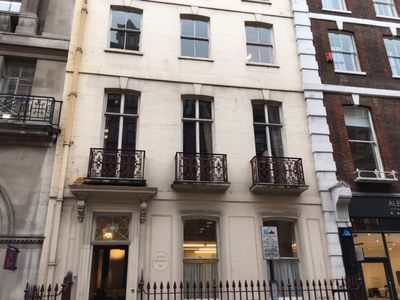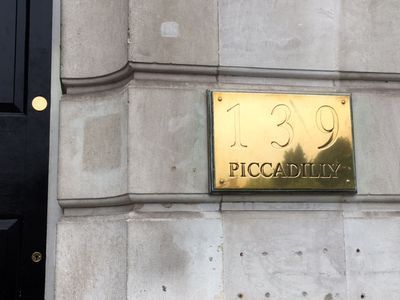Up in smoke
By GEORGE BERRIDGE
A short stroll from Hyde Park Corner will take you past two buildings that stand as reminders of some of the darkest days in the story of Lord Byron.
At 139 Piccadilly, you���ll find the Georgian mansion that for a short time served as home to his botched marriage to Annabella Millbanke.
If you walk for ten minutes down the road and take a sharp left, you���ll arrive at 50 Albemarle Street (see picture above), the house where, as Corin Throsby notes in her review of The Burning of Byron���s Memoirs, the ���greatest crime in literary history��� took place, perpetrated by the poet Thomas Moore, Byron���s publisher John Murray (whose name remains outside the house and on a brass plaque on the door) and his old university friend John Cam Hobhouse.
As one looks up at the chimney from which issued forth the charred pages, it feels like a good moment to reflect on writings that suffered the same fate, and those that avoided it ��� for better or for worse.
While Byron never intended for his work to go up in smoke, there are a number of writers who ��� for various reasons and to varying degrees of success ��� hoped for just that.
Gogol destroyed the second part of Dead Souls (intended as homage to Dante���s Purgatory) as part of a later-life obsession with Orthodoxy and Asceticism. Gerard Manley Hopkins, similarly, burned most of his poetry upon entering the priesthood.
Bulgakov torched the first copy of The Master and Margarita in 1930 for fear that he could not be a Soviet Writer. He (more or less) finished the novel in 1940, although an uncensored version didn���t appear until the seventies. As the quick-witted cat Behemoth tells us: ���Manuscripts don���t burn���. It���s a good thing for this jobbing hack that he was more figurative than literal, else this blog might be cut sh
To Kafka, then! The Castle, The Man Who Disappeared and The Trial only survived, after the author���s death at the age of forty, thanks to the disobedience of his dear friend and literary executor Max Brod. Kafka expressly told Brod that his work should be burned.
A sickly R. L. Stevenson ��� who almost killed himself writing the first version of Jekyll and Hyde ��� was so distressed by a questioning note from his wife and editor Fanny that he is said to have burned the pages of his manuscript in his room. Against all odds, rewriting the novella seems to have aided his convalescence (along with a few sharpeners, if some reports are to be believed) and he was bolstered in a number of weeks.
Lovers of literature owe an enormous debt not just to writers but also to their literary executors, ranging from Plotius and Lucius, saviours of the Aeneid (on which more shortly) to the indefatigable Robbie Ross, who rounded up the rights to the works of Oscar Wilde which had been sold off after he went broke.
I���ve been left chewing over the ethical question that faced a number of them: what duty is there to honour the dying wishes of authors? Should merit and significance be allowed to trump those wishes?
Have we been left bereft by the burning of Larkin���s diaries? (���[I am] rather depressed by the remorseless scrutiny of one���s private affairs that seems to be the fate of the newly dead. Really, one should burn everything.���) Of Saki���s? Of de Sade���s final manuscripts?
Consider two cases: Virgil and Nabokov. Virgil ��� who hauntingly describes the vanishing world and culture of Troy in Book II of the Aeneid, wreathed in flames ��� wished that the unedited copy of his work be turned to ash. Yet, on the orders of Augustus, who had been read sections, the poet���s final wishes were disregarded ��� and so we possess what was spared from the fires.
It is largely agreed that the original version isn���t too far from the final manuscript. So was it really not worth publishing? Should we indulge the often neurotic self-criticism of writers, or print and be damned?
Nabokov���s son, Dmitri ��� aware of the guilt-wracked Mr Moore? ��� argued prior to the publication of The Original of Laura: A Novel in Fragments, that "I wouldn't have wanted to go down in history as a literary arsonist".
This paper���s Editor, Stig Abell, agreed in his review of the book in 2009: ���Books are made to be read, not destroyed. And the work of epochal artists should be preserved and made public. The burning question is not, in the end, much of a burning question���.
Not all have been so forgiving. The Guardian took the critical line that money and fame might have been more important to the son than preserving his father���s legacy. This question of legacy ��� preserving or damaging it ��� brings to mind David Foster Wallace���s The Pale King. While it shows signs of brilliance, there is no getting around its sombre and often frustrating incompleteness (something discussed at greater length in Robert Potts���s review in April 2011).
Having concluded my walk at the big Waterstones just down the street, I sat in the shop���s caf��, surrounded by Kindles and other e-readers, I���m also left wondering if the romantic final orders of the above would be given today. Will the tradition survive in an age of USBs? ���Please, darling, have my hard-drives wiped��� doesn���t quite have the same impact, does it?
Peter Stothard's Blog
- Peter Stothard's profile
- 30 followers





